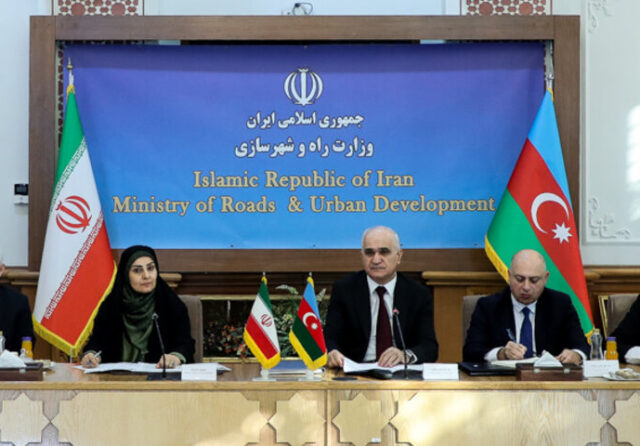
New Azerbaijan-Iran Railway Agreement Grapples With Regional Tensions
Publication: Eurasia Daily Monitor Volume: 21 Issue: 168
By:

Executive Summary:
- In October, Azerbaijani and Iranian officials discussed the Aras Corridor railway project, a strategic alternative to the contested Zangezur Corridor, amid ongoing Azerbaijan-Armenia tensions and diplomatic efforts to enhance regional connectivity following the 2020 Karabakh War.
- The Aras Corridor strengthens Azerbaijan–Türkiye–Central Asia ties and aligns with Iran’s International North-South Transportation Corridor, enhancing regional connectivity and trade routes toward Russia.
- Azerbaijan’s focus on the Aras Corridor reflects regional tensions, including opposition to the Zangezur Corridor, Iran-Israel conflicts, and Russia’s war against Ukraine. The project highlights Azerbaijan’s strategy of adapting to navigate shifting alliances and maintain regional goals.
On October 15, Chairman of Azerbaijan Railways Rovshan Rustamov arrived in Tehran to meet his Iranian counterpart Jabbar Ali Zakeri Sardroudi to discuss the construction of a railway line linking Azerbaijan’s East Zangezur region and its Nakhchivan exclave through Iran (News.az, October 15). The meeting came amid intensive diplomatic negotiations between Azerbaijan and Iran regarding the Aras Corridor transit route linking Azerbaijan to Nakhchivan and further to Türkiye via Iran after a period of silence and diplomatic rifts between the two neighbors (see EDM, March 27). The Aras Corridor project, strategically significant for both Baku and Tehran, emerged following Azerbaijan’s persistent efforts after the 2020 Karabakh War to establish regional communication lines, particularly a land route, through Armenia’s Syunik province to Nakhchivan and Türkiye, known as the Zangezur Corridor (Bne Intellinews, October 12, 2023; see EDM, November 3, 2023). The ongoing confrontation between Azerbaijan and Armenia over the land route through Syunik province has been a major point of contention, delaying the signing of a final peace treaty between Baku and Yerevan (see EDM, October 14, 2022; OC-Media, September 11).
Iran’s harsh stance toward the Zangezur Corridor has added fuel to the fire. A source from the Iranian foreign office highlighted this sentiment, stating, “Our border with Armenia must remain intact, and any corridor should be established with that in mind. … Our military power would only be deployed in response to any attempt to sever Iran’s border with Armenia” (Middle East Eye, September 17). Even though Iran’s intimidation did not have a significant impact on Azerbaijan’s recent foreign policy priorities, in August, Baku officially agreed to withdraw their demand for the Zangezur Corridor from a peace agreement with Armenia, removing a significant roadblock to the signing of a treaty (OC-Media, August 7).
Even so, the poor prospects regarding the Zangezur Corridor in the near future emboldened Azerbaijan to consider the Aras Corridor via Iran as an alternative route, even temporarily. As such, in January Azerbaijan launched construction work on a highway connecting the main part of Azerbaijan with Nakhchivan through Iran as well as a bridge across the Aras River (Trend.az, January 19).
Despite an agreement on a highway and a road bridge, Azerbaijan appeared reluctant to negotiate specific details regarding the construction of railway connections with Iran for over a year (see EDM, January 10). This may be explained by Azerbaijan’s desire to avoid criticism or potential pressure from its Western partners, such as the United States. This is especially true for Baku’s long-term ally Israel, which has been wary of Iran’s influence in the region, especially in light of the former’s ongoing large-scale operations against Hamas in the Gaza Strip and Hezbollah in Lebanon (see EDM, November 15, 2023, June 12; Stimson Center, July 24). Nonetheless, the rapidly changing regional dynamics, such as Russia’s ongoing advancement in Ukraine, worsening confrontation between Iran and Israel, and deepening security crisis in the Middle East have incentivized Azerbaijan to strengthen regional connectivity through the Aras Corridor project to minimize potential risks emanating from Iran (Stimson Center, July 24).
The recent agreement on new railway construction should come as little surprise. According to the plan, the railway line currently being built on Azerbaijani territory, the Horadiz-Agbend railway, will be connected to Iran via a new bridge over the Aras River and then link to Nakhchivan (Trends Research and Advisory, October 13). Additionally, as part of major infrastructure work, Azerbaijan and Iran’s agreement also envisages building a network of fiber-optic cables and electricity lines along the new corridor to facilitate the export of electricity (Haqqin.az, October 17).
Azerbaijan views the Aras Corridor as a part of the so-called “Turkic Corridor,” which will enable it to maintain strong trade links with Türkiye and the Central Asian states. As for Iran, the new route will be a vital link within the International North-South Transportation Corridor (INSTC), strengthening Iran’s ties with Russia (see EDM, March 27; Armenia Weekly, September 10). Unlike Azerbaijan, Tehran considers the Aras Corridor a permanent alternative to the Zangezur project. Simultaneously, Baku is still enthusiastic about the Zangezur Corridor but has asserted that it would prefer to discuss it as a separate issue with Armenia once the final peace treaty is signed (see EDM, December 18, 2023, July 9; AZE.media, October 17).
The Aras Corridor, a strategic move by Iran to regain some leverage in the South Caucasus Tehran lost after 2020, may not necessarily grant Iran the influence it desires. The new route will, however, significantly boost Azerbaijan–Türkiye–Central Asia trade and energy relations through improved infrastructure, leading to shorter travel times, and lower prices, thereby enhancing the viability of transnational commerce for local companies (Haqqin.az, October 17). In a broader context, Azerbaijan’s commitments to the Aras Corridor aim to maintain relative political and economic stability in the South Caucasus by providing secure access to the Caspian basin and Central Asian region.



